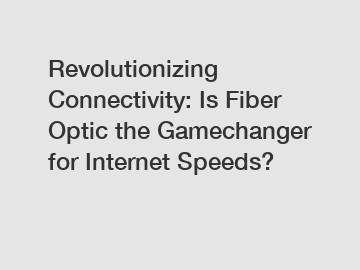Revolutionizing Connectivity: Is Fiber Optic the Gamechanger for Internet Speeds?
Revolutionizing Connectivity: Is Fiber Optic the Gamechanger for Internet Speeds?
In today's digitally-driven world, the internet has become an integral part of our daily lives. From streaming movies and videos to conducting online business meetings, we rely heavily on a fast and reliable internet connection. But with the growing demand for higher internet speeds, there has been a constant need for technological advancements that can keep up with our needs. Enter fiber optic, a technology that is revolutionizing connectivity and promising lightning-fast internet speeds.
Fiber optic, often referred to as optical fiber, is a type of cable that utilizes thin strands of glass or plastic to transmit data as pulses of light. Unlike traditional copper cables, which use electrical signals to transmit data, fiber optic cables offer significantly higher bandwidth, allowing for faster and more efficient data transfer. This technology has not only revolutionized internet speeds but has also impacted various industries such as telecommunications, healthcare, and infrastructure.

One of the biggest advantages of fiber optic cables is their ability to transmit data over long distances without any interference or degradation. Traditional copper cables suffer from signal loss over long distances and are susceptible to electromagnetic interference, resulting in reduced internet speeds. Fiber optic cables, on the other hand, can transmit data over much larger distances without any loss of signal quality. This is particularly crucial in today's interconnected world where data is constantly being transmitted across continents.
Another significant benefit of fiber optic technology is its incredible speed. While traditional broadband connections offer speeds ranging from 25 to 100 Mbps (megabits per second), fiber optic connections can reach speeds of up to 1 Gbps (gigabit per second). This means that tasks that used to take minutes or even hours to complete, such as downloading large files or streaming high-definition videos, can now be accomplished in a matter of seconds with fiber optic internet.
Moreover, fiber optic networks are future-proof, meaning that they have the potential to accommodate increasing demands for higher bandwidth in the years to come. As technology continues to advance and data-intensive applications such as virtual reality, augmented reality, and artificial intelligence become more prevalent, the need for faster and more reliable internet will only grow. With fiber optic infrastructure in place, the possibilities for innovation and development are limitless.
In addition to its speed and reliability, fiber optic technology also offers enhanced security. Unlike copper cables, which can be tapped into and intercepted, fiber optic cables are extremely difficult to tap without being detected. This makes fiber optic internet connections more secure and less susceptible to data breaches or cyberattacks. Encryption and other security measures can also be implemented at the network level to provide an additional layer of protection.
It is important to note that the installation of fiber optic networks does require significant investment and infrastructure development. However, the long-term benefits far outweigh the initial costs. Fiber optic networks not only improve internet speeds for residential users but also provide a solid foundation for businesses, hospitals, schools, and government institutions to operate efficiently. The economic advantages of having high-speed internet access are substantial, bringing new opportunities, attracting investment, and fostering innovation in communities.
The game-changing potential of fiber optic technology has not gone unnoticed by governments and telecommunication companies worldwide. Many countries have embarked on ambitious initiatives to expand and upgrade their existing internet infrastructure with fiber optic networks. For instance, South Korea, Singapore, and Hong Kong are leading the way in terms of internet speeds, thanks to their extensive fiber optic infrastructure. Similarly, countries like the United States and European nations are investing heavily in fiber optic deployment as they recognize its transformative impact on connectivity.
In conclusion, fiber optic technology is undoubtedly the gamechanger for internet speeds. Its ability to offer faster data transmission, excellent reliability, heightened security, and future scalability make it a vital component of our ever-evolving digital landscape. As the demand for high-speed internet continues to soar, fiber optic networks will play a pivotal role in revolutionizing connectivity across the globe. It is safe to say that fiber optic is not only a technological advancement but also a catalyst for societal progress.
If you are looking for more details, kindly visit Custom Av Cables, Copper Cable Supplier, Copper Cable Accessories.
221
0
0

Comments
All Comments (0)